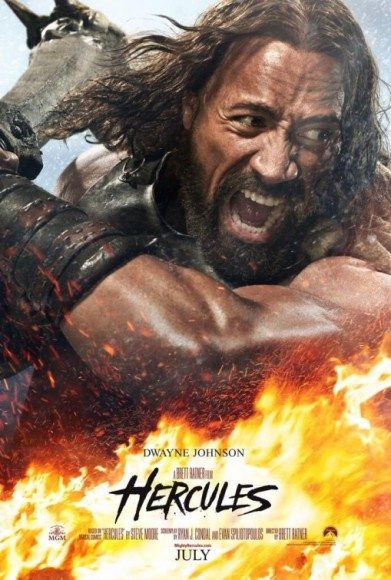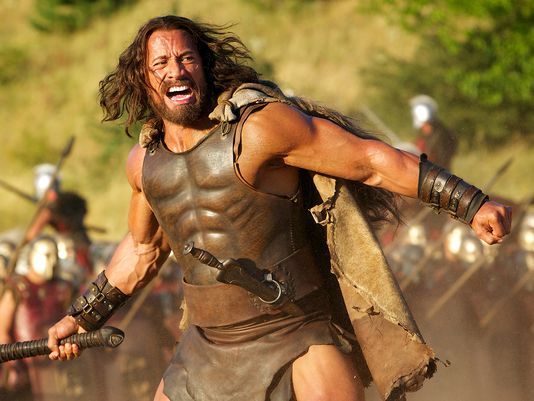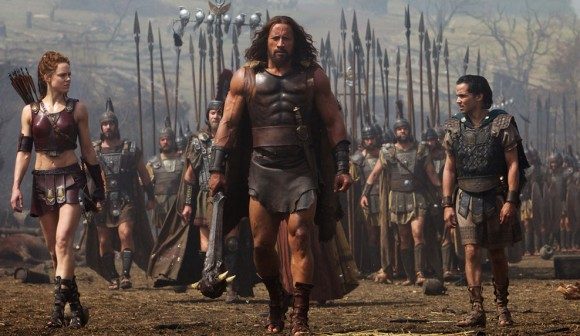A group of mercenaries whose adventures have become the stories of legend tries to turn a town of farmers into soldiers to protect their lands from bandits. Am I talking about The Seven Samurai? The Magnificent Seven? ¡Three Amigos!? No. But how I wish I was.
From a tradition that’s hopefully dying out, Hercules recalls a time when revisionist history was in vogue. Those movies that tried to take our favorite fairy tales and legends, strip away their magic, and turn them into something gritty and “real.” (E.g. Ridley Scott’s Robin Hood, Rupert Sander’s Snow White and the Huntsman.) This time, director Brett Ratner (X-Men: The Last Stand, Rush Hour) turns his attention towards the most popular Greek of them all – Hercules (played by Dwayne Johnson, whom I don’t dislike as an actor and I think has natural charisma, but he seems particularly poor in the role until the movie devolves into action and screaming). Instead of being the demigod son of Zeus, he’s just a guy who’s really strong. His iconic trials, just tales. Even the Hydra was just guys in serpent masks. Using stories to bolster his reputation, he chooses the best possible job – leader of a group of mercenaries (but ones with hearts of gold, naturally).
Hercules’s gang is made of the traditional misfits. Rufus Sewell’s Autolycus cares more about riches than honor before going off Solo (sic) prior to the final battle. Ian McShane (as the seer Amphiaraus) continues to be the go-to-guy for modern day swords-and-sandals epics (he’s also in Snow White and the Huntsman and Jack the Giant Slayer) while constantly bringing his A-game and being far, far too good for any of this nonsense. Relative newcomer Ingrid Bolso Berdal wears midriff-baring body armor as the group’s solo female member, the archer Atalanta. Berdal is clearly auditioning to be an associate to Thor‘s Good Lady Sif or Justice League‘s Wonder Woman, and I wouldn’t be surprised or disappointed to see her show up in Asgard or Themyscira. There’s also Reece Ritchie as Iolaus, the storyteller who wants to be a warrior (guess who proves his mettle by the end?) and Askel Hennie as Tydeus, the guy who seems “off” but is really super loyal. Because this movie doesn’t trust us to use our brains, Atalanta will actually proclaim that they’re something of a family.
Following their latest victory, Hercules’s band is commissioned to come to a village in Trace led by Lord Cotys (John Hurt) to train farmers to fight bandits who threaten to destroy their land. This one job will earn them enough money to retire. Clearly, everything will go according to plan.
The first two acts of the film are relatively simple and look cheap, with its centerpieces – two truly uninspired fight sequences – both on wholly unexceptional open fields. Hercules doesn’t even bother to establish the leader of the bandits (Rhesus, Tobias Santelmann looking way too much like Eomer in the Lord of the Rings trilogy) as a credible villain with any real motivation or plan, instead hoping that “leads a gang of ne’er-do-wells” will suffice.
Because this movie needs to reach feature length, we get a third act that throws in every trope it can think of. Is there going to be a betrayal? Is that actor you kind of know who only showed up for 2 minutes an hour before going to come back as a secondary villain? Is Hercules going to need a pep talk to regain faith in himself (despite never really appearing to lose it)? Villains underestimating the hero despite seeing him perform ridiculous feats not a half minute prior? A Band of Brothers knock off speech? Noble sacrifice? You know the answers.
Obviously, these things have remained a standard in literature and film for a reason, so including them is not necessarily a deal-killer. But Hercules doesn’t even try to make them new or exciting or interesting; it only cares about hitting the points as cheaply and quickly as it can and moving on. Motivations are muddled, villainy is for villainy’s sake, and applause moments are considered a given rather than earned. Ever think you’d think back fondly on the Sam Worthington-led Wrath/Clash of the Titans? Yeah. Me neither.
Verdict: 2 out of 5
Hercules continues the tradition of some modern Greek mythology film (e.g. the Titans movies, Immortals) of not really appreciating the depth of tradition or culture in their source material. Myth vs. reality is clearly a rich tapestry on which to weave a film, but this one seems to use it less to make a point and more to avoid creativity. It’s easier (and cheaper) to film a guy on a horse in shadow than it is to create a centaur, and it’s easier to knock off better films in concept and in look (even the closing credits are “borrowed” from 300) than come up with unique imagery. Combine those issues with a paint-by-numbers screenplay and a lack of style and you get something disappointingly lifeless, too light to be truly revisionist and too unimaginative and generic to be fun.
Or maybe I’m just perplexed by the decision to start a presumed franchise about Hercules with what should amount to a footnote in his life.



